Search
 Video
Video
Keeping Babies in the Picture: How to Address Fertility Concerns in Primary Care
Reproductive endocrinologist and fertility specialist Eleni Greenwood Jaswa, MD, MSc, presents a practical guide to helping patients concerned about failure to conceive. News
News
How AI Can Help Streamline Patient Referrals and Expedite Cancer Treatment
UCSF investigators recently partnered with IIAM Corporation to determine whether a supervised machine learning (ML) model accurately predicts whether patients with head and neck cancer should be recommended for surgery based on the medical information provided at the time of referral. News
News
Neurosurgical Treatment Algorithm During the COVID-19 Pandemic
As medical centers across the world prepare for and respond to the COVID-19 pandemic, guidelines for providing vital care, while protecting the safety of both patients and health care workers, are increasingly critical. Video
Video
A Weight Off Your Shoulders: Better Ways to Identify Common Shoulder Conditions
In this video, orthopedic surgeon Justin Krogue, MD, helps PCPs efficiently assess the complaint, with tips on how patients typically describe specific injuries, valuable questions for history-taking, and simple hands-on tests to perform in the exam room. Video
Video
Prevent and Manage HIV in Primary Care: New Evidence on What Works
Infectious disease specialist John Szumowski, MD, MPH, unpacks recent data and study results that bear strongly on therapy selection, looking at oral drugs versus injectables, new versus standard meds, and how to make the best call for individual patients.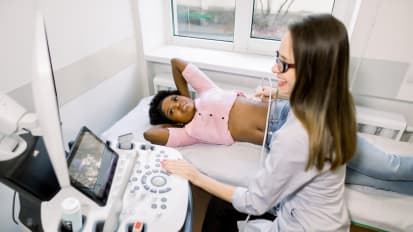 Video
Video
The Evidence on Incidentalomas: When to Investigate, When to Rest Easy
This presentation from radiologist Hailey H. Choi, MD, supplies straightforward criteria to help providers assess lesions ranging from thyroid and adrenal nodules to ovarian cysts to pancreatic and liver lesions. News
News
First Global Guidelines for Pregnancy and Inflammatory Bowel Disease Developed
For women with inflammatory bowel disease (IBD), pregnancy can be an uncertain time due to limited clinical data about how IBD medications impact pregnancy outcomes and infants who have been exposed to IBD medications in utero. Video
Video
Getting Patients Back on Their Feet: How to Diagnose and Treat Common Ankle and Foot Injuries
Orthopedic surgeon Lan Chen, MD, FAAOS, presents a primer on ankle sprains, Achilles ruptures and acquired flatfoot, with straightforward physical exam tips, imaging recommendations, counsel on managing patients’ expectations, and guidance on when to choose surgery or refer for specialty care. News
News
Predictive Biomarkers, Tailored Therapy Among Conference Presentations
UCSF’s Eric J. Small, MD, becomes ASCO president at ASCO 2025 meeting News
News
Novel Intraoperative Prostate Cancer Imaging Method Reveals Previously Undetectable Disease
UCSF researchers led the first-in-human study of a novel near-infrared fluorescence imaging agent that targets prostate-specific membrane antigen (PSMA). Video
Video
Jabs for Joints and Tendons: Hurting Patients Want PRP and Stem Cells – But Do They Work?
Patients with aching knees, elbows and other common musculoskeletal problems hope that platelet-rich plasma or stem cell injections could bring relief – and they have lots of questions. Video
Video
Learning and Lowering Cardiovascular Risk: Effective, Efficient Strategies
This data-driven presentation from cardiologist Eveline Stock, MD, will give you a better grasp on how to identify an at-risk patient. Video
Video
Approaching Endometriosis: Deliver the Right Care for Individual Patients
Gynecologist Jeannette Lager, MD, MPH, associate director of the UCSF Endometriosis Center, offers a thorough update on this painful condition impacting around 10% of U.S. women.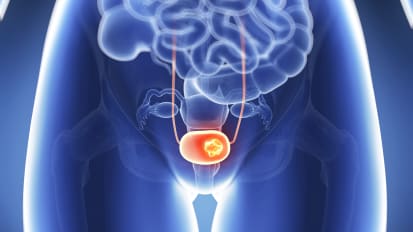 Video
Video
Muscle Invasive Bladder Cancer
With at least one-quarter of bladder cancer patients presenting with deadly muscle-invasive tumors, decisions on staging and treatment are profound – yet must be made swiftly.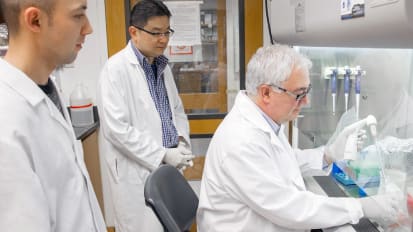 News
News
Screening and Removal of Precancerous Lesions Prevents Anal Cancer
National study led by UCSF is first to show effectiveness of simple strategies to reduce risk of often silent cancer.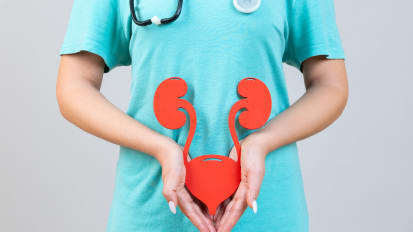 Video
Video
Urinary Misery: How to Help Female Patients With Persistent Dysuria
In this resource-packed talk, urogynecologist Caitlyn E. Painter, DO, explains how to categorize causes, what to understand about urine cultures and other tests, and the latest evidence on which treatments help patients. Video
Video
Cancer Update: Safe Opioid Use and Innovations in Blood Cancer Therapies
In this three-part presentation, UCSF substance use experts offer prescribing strategies and tips on patient communication to ensure pain relief without enabling drug dependence.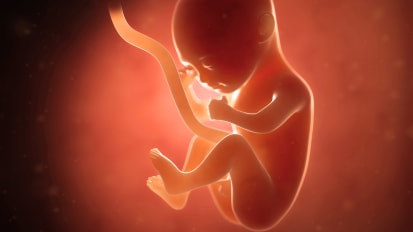 Video
Video
The Fetal Treatment Center in Oakland: Expanded Services, Informed Strategies - Intro
Learn which patients may benefit from referral and what to expect from the process in this update from perinatologist Annalisa Post, MD. Video
Video
A Surge in Sports Stress: How to Support Child Wellness During COVID
Sports specialization and misguided parenting practices have led to undue stress on athletic youngsters, with physical and psychological consequences now exacerbated by the quarantine. Document
Document
Headache Center Inpatient Referral Guide
As the only program with an Inpatient Headache Treatment Unit in Northern California, UCSF’s Headache Center helps improve the quality of life for individuals suffering from debilitating headaches. News
News
Why Do Some Long Covid Patients Continue to Have Difficulty Exercising?
While some patients recover from the effects of SARS-CoV-2 infection, others have experienced the aftereffects of COVID-19 long after the initial infection. One of these long COVID symptoms is reduced exercise capacity. News
News
UCSF Health Cancer Services Earns National Accreditation from the Commission on Cancer of the American College of Surgeons
The UCSF cancer program has been continuously accredited by the CoC since 1933, demonstrating its commitment to the best outcomes possible for its cancer patients. Video
Video
Hurting Hips: How to Identify and Manage Common Conditions
Orthopedic surgeon and sports medicine specialist Stephanie Wong, MD, takes you on a “tour of the hip” in this straightforward guide to acute and chronic hip injuries frequently seen in clinic. Video
Video
Headache Update - Module 2
Here’s a guide to secondary headaches caused by trauma, infection, intercranial pressure, and more, including red flags for when to investigate further. Headaches related to vascular disorders, for example, can be dangerous and require early diagnosis.

